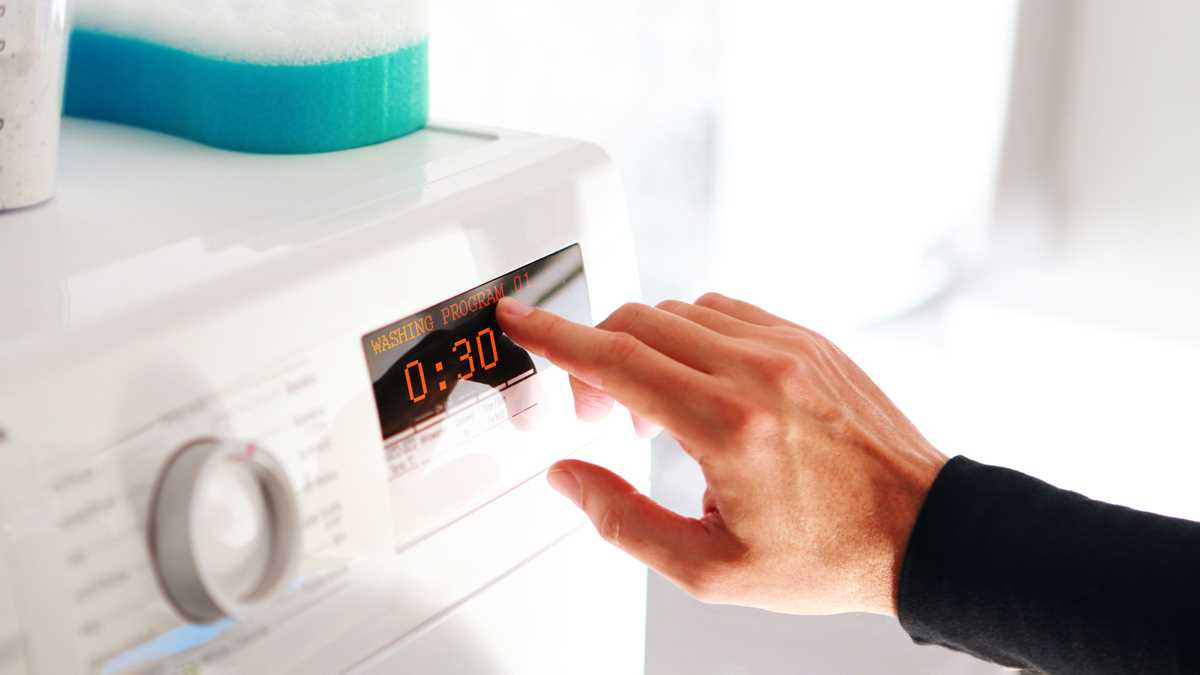




A power outage can be a frustrating experience, especially when it happens during a washing machine cycle. Not only is your laundry left incomplete, but you may also worry about potential damage to your appliance. However, there are steps you can take to handle a power outage during a washing machine cycle and minimize any potential problems.
Firstly, it is important to stay calm and avoid panic. Power outages are often temporary, and most modern washing machines are equipped with safety features to protect them from electrical disruptions. As soon as the power goes out, refrain from immediately attempting to restart the machine. Instead, unplug it from the electrical outlet and wait for the power to be restored.
In the meantime, make sure to keep the washing machine lid closed to prevent any water from spilling out. If your laundry load is soaked and not properly drained, you can manually drain the water using the machine’s drain hose. Remember to place a bucket or container beneath the hose to collect the water. This will help prevent any potential flooding or water damage once the power is back on.
Once the power is restored, plug the washing machine back into the electrical outlet. Check if the machine has a power “reset” button or switch, and use it if necessary. If not, simply select the appropriate wash cycle and restart the machine. It is also important to inspect the laundry load and make any necessary adjustments. For example, if the clothes have been sitting wet for an extended period, consider rewashing them to prevent any unpleasant odors or mold growth.
In conclusion, a power outage during a washing machine cycle can be inconvenient, but it doesn’t have to be a major problem. By staying calm, following the necessary steps, and taking a few precautions, you can handle the situation effectively and minimize any potential damage or inconvenience. Remember to prioritize safety and consult your washing machine’s manual for specific instructions related to power outages.
What to Do: Power Outage During a Washing Machine Cycle
Experiencing a power outage while your washing machine is running can be frustrating. Here are some steps you can take to handle the situation effectively:
1. Stay Calm
The first thing you should do is remain calm. Power outages can happen for various reasons, and it is important not to panic.
2. Check the Power
Verify that the power outage is not limited to your home. Check if the lights or other appliances are also not working. If the outage is house-wide or building-wide, you may need to contact your electricity provider to report the issue.
3. Reset Your Circuit Breaker
If the power outage is only affecting your washing machine, check your circuit breaker panel for any tripped breakers. Reset the breaker if needed and see if the power returns to your washing machine.
4. Unplug the Washing Machine
Disconnect the washing machine from the power outlet. This will help protect the appliance from any surges once the power is restored.
5. Check for Water Overflow
Look inside the washing machine drum to ensure there is no excess water. If there is a large amount of water, you may need to manually drain it before proceeding.
6. Resume the Cycle
Once the power is restored, plug the washing machine back in and resume the cycle. If necessary, select the appropriate wash settings and start the machine again.
7. Evaluate the Load

Depending on the duration of the power outage, you may need to assess the cleanliness of the laundry. If the clothes have been sitting wet in the washing machine for an extended period, it may be necessary to rerun the cycle.
8. Consider a Surge Protector
To prevent future interruptions during power outages, you may want to invest in a surge protector for your washing machine. This device can help protect your appliance from power surges and ensure a more reliable operation.
By following these steps, you can effectively handle a power outage during a washing machine cycle and minimize any potential damage or inconvenience.
Safety First: Unplug and Secure the Washing Machine
During a power outage while your washing machine is in operation, it’s important to prioritize safety. Follow these steps to ensure your safety and prevent any damage to your washing machine:
1. Unplug the Washing Machine
The first step is to unplug your washing machine from the power source. This will prevent any power surge or electrical damage when the power is restored. Unplugging the machine will also eliminate the risk of electrocution.
2. Secure the Washing Machine
Once the washing machine is unplugged, take measures to secure it in place. An unsecured washing machine may become unstable during a power outage, causing it to tip over and potentially cause injury or damage. Consider using straps or brackets to secure the machine to the wall or floor.
3. Wait for Power Restoration
After you have unplugged and secured the washing machine, wait for the power to be restored. Avoid using alternative power sources, such as generators or inverters, to power the machine during the outage, as they may not provide a stable and consistent power supply.
4. Assess the Condition

Once the power is restored, assess the condition of your washing machine. Check for any signs of damage or malfunction before resuming your laundry cycle. If you notice any issues, such as strange noises, leaks, or error codes, it’s recommended to contact a professional technician for further inspection and repair.
5. Restart the Washing Machine
If everything looks normal and there are no apparent issues, you can proceed to restart the washing machine. Close the lid or door, select the appropriate cycle, and press the start button to resume your laundry task.
By following these safety steps, you can prevent electrical hazards and damage to your washing machine during a power outage. Remember to prioritize safety and consult a professional if you encounter any problems or concerns.
Check the Power Source: Reset Circuit Breaker or Fuse
If your washing machine loses power during a cycle, the first thing you should check is the power source. Start by checking if the circuit breaker connected to the washing machine has tripped or if the fuse has blown. Here are the steps to check and reset the circuit breaker or fuse:
- Locate the circuit breaker box or fuse box in your home. It is usually found in the basement, utility room, or garage.
- Open the circuit breaker box or fuse box.
- Look for the breaker or fuse that is connected to your washing machine. It may be labeled as “Washer” or “Laundry Room”.
- If you have a circuit breaker, check if it is tripped to the “Off” position. If it is, firmly push it to the “On” position.
- If you have a fuse, check if the metal strip inside it is broken or melted. If it is, you need to replace the fuse with a new one of the same amperage.
- Once you have reset the circuit breaker or replaced the fuse, close the circuit breaker box or fuse box.
After checking and resetting the circuit breaker or fuse, try turning on your washing machine again to see if it has power. If it still doesn’t have power, you may need to contact a professional electrician to inspect the electrical wiring in your home or consider getting the washing machine repaired.
Pause the Cycle: Manually Drain Water from the Machine

In the event of a power outage during a washing machine cycle, it is important to manually drain the water from the machine to prevent any potential damage or flooding. Follow these steps to safely drain the water:
- Find a large container or bucket that can hold the amount of water currently in the washing machine.
- Locate the drainage hose at the back of the machine. It is usually connected to a drain pipe or directly to a utility sink.
- Place the open end of the drainage hose into the container or bucket.
- Remove any clamps or clips holding the hose in place and let the water flow out of the machine and into the container.
- Keep an eye on the container and empty it out as needed to prevent overflow.
- Once the water has been drained, you can manually unlock the door or lid of the machine to remove your clothes.
- Inspect the machine and make sure everything is in proper working order before continuing with your laundry.
Caution: Be cautious when handling the drainage hose as the water may be hot and could cause burns. Use gloves or wait for the water to cool down before touching the hose.
By manually draining the water from your washing machine during a power outage, you can avoid potential damage to your machine and ensure a smooth continuation of your laundry routine once the power is restored.
Protect Your Clothes: Remove Wet Items from the Machine
When experiencing a power outage during a washing machine cycle, it is important to protect your clothes by promptly removing wet items from the machine. Depending on the duration of the power outage, leaving wet clothes in the machine can lead to unpleasant odors, mildew, and even damage to the fabrics.
To ensure the best care for your clothes, follow these steps:
- Stop the Machine: If the power outage occurs during the cycle, stop the machine immediately. Most washing machines have a pause or stop button that you can use to halt the cycle.
- Open the Door: Once the machine has stopped, carefully open the door. Be cautious as there may be residual water that could splash out.
- Remove Wet Clothes: Gently remove the wet clothes from the machine, taking care not to wring them out excessively as this can damage the fabrics. Instead, allow them to drip dry for a moment.
- Find a Suitable Drying Area: Identify a suitable drying area for your wet clothes. This can be an indoor drying rack, an outdoor clothesline, or any other well-ventilated area.
- Hang or Lay Flat: Depending on the type of fabric, hang the clothes on hangers or lay them flat to dry. Hanging works well for most items, while delicate fabrics may benefit from lying flat to prevent stretching or distortion.
- Monitor the Drying Process: Keep an eye on the clothes as they dry, ensuring that they are receiving adequate airflow. This will help prevent any musty smells or mildew from developing.
- Complete the Washing Cycle: Once the power is restored, you can resume the interrupted washing cycle or start a new one if necessary. Make sure to check if any adjustments to the settings or additional detergent are required.
By taking swift action to remove wet items from the machine during a power outage, you can protect your clothes from potential damage and ensure they dry properly. Remember to always prioritize safety when handling any electrical appliances.
Prevent Future Outages: Use Surge Protectors or Uninterruptible Power Supply (UPS)
Experiencing a power outage during a washing machine cycle can be frustrating. To avoid such situations in the future, it is a good idea to use surge protectors or uninterruptible power supply (UPS) systems. These devices can help protect your appliances and prevent potential damage caused by power fluctuations.
Surge Protectors
A surge protector is a device that is designed to protect your electronic devices, including your washing machine, from power surges or spikes. These power surges can occur due to lightning strikes, power outages, or electrical faults.
Surge protectors work by diverting excess voltage away from your appliances and preventing them from getting damaged. They typically have multiple outlets, allowing you to connect multiple devices to the surge protector.
When choosing a surge protector for your washing machine, make sure to look for one that can handle the power consumption of your appliance. Consider the Joule rating, clamping voltage, and the number of outlets when making your selection.
Uninterruptible Power Supply (UPS)
An uninterruptible power supply (UPS) is a device that provides backup power when the main power source fails. This can be particularly useful during power outages as it allows you to continue using your washing machine without interruption.
A UPS typically consists of a battery backup and a surge protector. When the main power source fails, the battery kicks in, providing power to your appliance. This gives you enough time to safely finish your washing machine cycle or save your work on other electronic devices.
When choosing a UPS for your washing machine, consider the capacity of the battery backup, the number of outlets, and the estimated runtime provided by the UPS. It is also important to regularly check the battery status and replace it when necessary to ensure the UPS functions properly.
Conclusion
Investing in surge protectors or uninterruptible power supply (UPS) systems can help prevent future outages and protect your washing machine from potential damage. These devices are relatively affordable and easy to install, making them a worthwhile investment for safeguarding your appliances.
FAQ
What should I do if there is a power outage while my washing machine is running?
If there is a power outage while your washing machine is running, the first thing you should do is to check if the power outage is affecting other appliances in your home. If it is, then it is likely a power outage in your area. In this case, you can wait for the power to come back on and the washing machine will continue where it left off. If the power outage is only affecting your washing machine, you can try restarting it once the power comes back on. However, be aware that starting a washing machine mid-cycle can sometimes cause problems with the machine or the clothes inside. It is best to consult the manufacturer’s instructions or contact a professional if you are unsure.
Will a power outage damage my washing machine?
In most cases, a power outage will not damage your washing machine. However, if the power outage is accompanied by a power surge when the power comes back on, it may cause damage to the electrical components of the machine. To protect your washing machine from power surges, it is recommended to use a surge protector or to unplug the machine during a power outage. Additionally, starting a washing machine mid-cycle after a power outage can sometimes cause problems with the machine or the clothes inside. It is best to consult the manufacturer’s instructions or contact a professional if you are unsure.
How long can clothes stay in the washing machine during a power outage?
If there is a power outage during a washing machine cycle, it is best to remove the clothes from the machine as soon as possible. Leaving wet clothes in the machine for an extended period of time can cause them to develop a musty smell or even grow mold. If the power outage is expected to last for a long time, you can remove the clothes from the machine and wring out any excess water by hand before hanging them up to dry. Once the power is restored, you can then resume the washing process.
Can I manually drain the water from my washing machine during a power outage?
In most washing machines, there is a manual drain option that can be used during a power outage. This option allows you to manually drain the water from the machine without using electricity. The exact process for manually draining the water will vary depending on the make and model of your washing machine. It is best to consult the manufacturer’s instructions or contact a professional for guidance on how to manually drain the water from your specific machine.
Is there a way to resume a washing machine cycle after a power outage?
Yes, in some cases, you can resume a washing machine cycle after a power outage. Once the power comes back on, you can try restarting the machine and it should continue where it left off. However, be aware that starting a washing machine mid-cycle can sometimes cause problems with the machine or the clothes inside. It is best to consult the manufacturer’s instructions or contact a professional if you are unsure. Additionally, if the power outage is expected to last for a long time, it is recommended to remove the clothes from the machine and wring out any excess water by hand before hanging them up to dry.
What should I do if the power goes out during a washing machine cycle?
If the power goes out during a washing machine cycle, it is important to stay calm and not panic. First, check if the power outage is on your end or a general power outage in your area. If it is a general power outage, there is not much you can do except wait for the power to come back on. However, if it is just an issue with your home’s power, you can try resetting the circuit breaker or checking if a fuse has blown. Once the power is restored, you can resume the washing machine cycle from where it left off.














